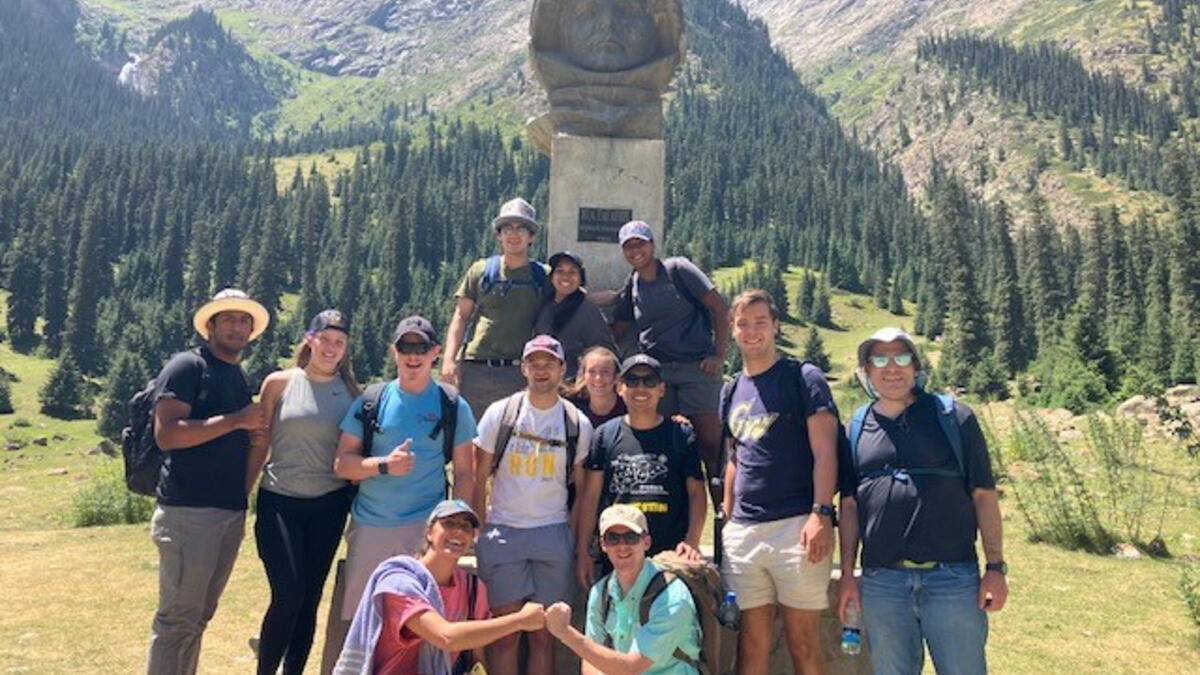US Department of Education names ASU's Melikian Center a National Resource Center on Russian, Eurasian and East European Studies

Students in the Critical Languages Institute's Russian program at Lake Issyk-Kul near Bishkek, Kyrgyzstan, in front of the statue of Soviet cosmonaut Yuri Gagarin.
The Melikian Center for Russian, Eurasian and East European Studies, housed in The College of Liberal Arts and Sciences at Arizona State University, has a mission to advance innovative use-inspired research and teaching on the languages, societies and geopolitics of greater Eurasia. Recently, it was designated a National Resource Center by the U.S. Department of Education.
“This designation as a National Resource Center reflects many years of hard work and innovation by faculty and students, the vision and generosity of Greg and Emma Melikian and their family in establishing an endowment to advance the study of Russia, Eurasia and East Europe, and the consistent institutional support from university leadership,” said Keith Brown, center director and professor in the School of Politics and Global Studies.
The National Resource Center program began in the 1950s, when the U.S. government recognized the value of investment in better understanding the cultures of different areas of the world. The four-year grant will help to support instruction, research and public outreach in international studies and issues in world affairs.
The grant will also support the work of the center’s Critical Languages Institute (CLI), established in 1991 — the year marking the dissolution of the Soviet Union — which provides intensive summer instruction in less commonly taught East European and Eurasian languages (e.g., Albanian, Armenian, Russian and Turkish) with the goal of building proficiency and intercultural competence.
Since the Soviet Union’s demise, U.S. perceptions of the region have evolved slowly, and the center’s staff and faculty have worked to offer insight and combat prejudice and disinformation on this part of the world.
As well as designation as a National Resource Center, the Melikian Center also received funding for student fellowships in foreign language and area studies.
Over the next four years, the $1.9 million in new support will build capacity at the center, with a focus on expanding public outreach through strategic partnerships and broadening access for students in all fields — including engineering, law, business, geopolitics, sustainability, social justice and human rights — who want to learn more about the languages, politics and cultures of this region.
Faculty across all ASU campuses will be introducing region-focused readings, films, case studies and project work into their curricula, and the center will coordinate with other advising and mentoring resources, including its strong alumni network, to help students from all backgrounds to gain career-ready skills.
“With the help of this new funding, CLI will be expanding its overseas programs and building on partnerships to offer students advanced learning opportunities in Central Asia, East Europe and the Balkans,” said Brown. “CLI faculty — most of whom are native speakers with incredible knowledge about the countries whose languages they teach — are excited to combine the best of online and in-person pedagogy, to grow enrollment in CLI's first-year intensive classes and also add more programming for advanced learners.”
The center is also working on projects locally and will be collaborating with Arizona-based organizations and educational institutions.
“One of the components of the proposal we are most excited about is the implementation of a multiyear collaboration with Maricopa Community Colleges' International and Intercultural Education program and with the Phoenix Committee on Foreign Relations to train and support students and faculty in oral history,” said Brown. “The project will connect students and classes with heritage community members, retired or active development professionals, Peace Corps volunteers, diplomats and others with regional experience, interests and/or roots.”
Brown is excited about the end goal of this collaboration, which is to create and maintain a shared resource that reveals Arizona's global ties, to advance teaching methods that emphasize collaborative knowledge production and intergenerational learning and to provide opportunities for diverse students to acquire valuable research skills, build professional relationships and imagine global futures for themselves.
Established as a consortium in 1984, the Melikian Center adopted its current name in late 2006, in recognition of the generous support of Gregory and Emma Melikian. The Melikians are of Armenian descent, and between them, they speak numerous languages, including Russian and Armenian.
“This important designation is a testament to their vision for the center and their goals of ensuring that future generations understand all people of the world and participate in global engagement,” said Brown.
More Law, journalism and politics
Can elections results be counted quickly yet reliably?
Election results that are released as quickly as the public demands but are reliable enough to earn wide acceptance may not…
Spring break trip to Hawaiʻi provides insight into Indigenous law
A group of Arizona State University law students spent a week in Hawaiʻi for spring break. And while they did take in some of the…

LA journalists and officials gather to connect and salute fire coverage
Recognition of Los Angeles-area media coverage of the region’s January wildfires was the primary message as hundreds gathered at…

